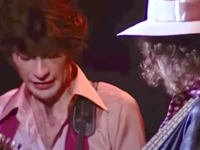Bob Dylan was, as The Basement Tapes were being put down, a wreck — overworked, over analyzed, over doing it. In trying to forge an electrified version of his own music, with most of the Band in tow, he had pushed himself to the limit. Still, as the fanciful storytelling of this Levon Helm-sung track makes clear, Dylan could still pull from his muse no small amount of magical, if still rueful, whimsy.
Upstate New York, and these now legendary sessions with the Band, provided a sense of refuge from everything that had happened, every expectation that Bob Dylan had had foisted upon him, and every misconception that he’d had to push back against. Meanwhile, the Band — who, save for the sadly lost Helm, had backed him through these tumultuous times — was coming into its own, as well. An intriguing intersection can be found with “Don’t Ya Tell Henry,” which dates to the period after Dylan’s motorcycle crash in the summer of 1967 and was also part of the Band’s lost performance at the Woodstock festival in 1969. An early version, boozy and loose, even featured Dylan on lead — before the Band reworked the song with Helm singing. He was featured not on drums (which were handled by Richard Manuel), but on mandolin, presaging Helm’s late-career resurgence on the instrument.
Gone are the benzedrine beats of Bob Dylan’s earlier work with the Hawks, who themselves have become reborn in both name and in spirit, as well. They were finding, in fits and starts, a new musical language for themselves — something that would lead Dylan to the homespun joys of John Wesley Harding and Helm and Co. to the Americana big bang that was Music from Big Pink. But first there were things to work out, an amazing number of side roads to explore.
The tough R&B influences that had ruled the imaginations of the Band long before Bob Dylan came along, when they were backing a transplanted rockabilly hound named Ronnie Hawkins, fell away. Something more elemental emerged in its place — something quieter, direct, honest, free flowing and, ultimately, archetypical of so much that subsequently happened in both of their careers.
It happened in the most organic of ways, whatever the post-script additions that went into constructing the original Robbie Robertson-curated Basement Tapes, released on June 26, 1975. Garth Hudson has described the original sessions as idyllic, a place where there was no time. Bob Dylan would scribble something out like “Don’t Ya Tell Henry,” then everyone would wander downstairs at this house outside of West Saugerties, New York, and put things to tape.
Dylan (and, to some degree even then, Robbie Robertson) had begun immersing himself in Southern gothic tales, murder ballads, scarifying folk and morality plays, but it was Levon Helm — the native of Turkey Scratch, Arkansas — who brought some sense of historical context to such pursuits. These weren’t exotic curios to him; they were like muscle memory. That’s why this version of “Don’t Ya Tell Henry,” with Helm out front, is so clearly superior.
Still, for all of that sense of brotherhood — and of shared artistic community — in this music, it couldn’t have been more divorced from everything (so much of it brash, experimental, fiery) that was going on outside of those pink-painted walls. And it wasn’t just the back-to-basics sensibility of the music that Bob Dylan and the Band were making. There was a humor to it, though often so very dark, that was missing in the visceral, technicolor sounds of 1967.
“Don’t Ya Tell Henry,” a terrific example, follows this wandering, nonsense-talking sot as he ambles from the river around to the beanery and then the whorehouse, even as Robbie Robertson’s solo indulges in a series of rootsy retorts. Meanwhile, Garth Hudson provides a saloon-shaking piano accompaniment to Helm’s deeply humorous hillbilly howl (“apple’s got your fly!”), even as bassist Rick Danko joins in on a crying second vocal. Yet, somewhere beyond that winking fun, there looms something that feels like very bad karma for this too-intrepid adventurer.
“This is some of the deepest funny music that anyone has ever made,” long-time Village Voice critic Robert Christgau says in the film Down in the Flood: Associations and Collaborations. “One of the reasons it’s so satisfying is that there is all of this truth and wisdom, and struggle and pain in it. But the funniness sort of triumphs. It prevails. That makes it feel very good.”
Of course, as with everything surrounding the 1975 edition of The Basement Tapes, there remains a lasting discourse on when “Don’t Ya Tell Henry” was recorded. Rob Bowman, in the liner notes for 2005’s A Musical History, and Luigi Cesari (whose discography we’ve used as the principal source for our Across the Great Divide series), assert that the Band’s take on “Don’t Ya Tell Henry” was put down either late in 1967 or early in 1968. Sid Griffin, meanwhile, quotes Basement Tapes engineer Rob Fraboni as saying the song was recorded in 1975.
- How Deep Cuts on ‘Music From Big Pink’ Underscore the Band’s Triumph - July 31, 2023
- How ‘Islands’ Signaled the Sad End of the Band’s Five-Man Edition - March 15, 2022
- The Band’s ‘Christmas Must Be Tonight’ Remains an Unjustly Overlooked Holiday Classic - December 25, 2016




